Blueprint for Resilience: Business Continuity Management for Property Developers
eBook 1: Understanding Your Organisation: Property Developer
Overview of BCM for Property Developer

Property developers face unprecedented challenges in today’s dynamic environment—from natural disasters and economic shifts to supply chain disruptions and regulatory changes.
As projects become more complex, so do the risks that can interrupt operations, delay timelines, and impact financial stability. Business Continuity Management (BCM) offers a systematic approach to identifying, mitigating, and recovering from these disruptions.
It ensures property developers maintain critical business functions and protect their investments, reputation, and stakeholder trust. "Blueprint for Resilience: Business Continuity Management for Property Developers" provides a comprehensive guide for building and maintaining a resilient framework specifically tailored to the unique needs of property development professionals.
eBook 1: "Understanding Your Organisation: Property Developers"
eBook 1: "Understanding Your Organisation: Property Developers" delves into the essential elements of the property development business, setting the groundwork for a robust BC plan. It begins with an overview of the different types of property developers, such as residential, commercial, and industrial developers, and examines how these types shape BCM implementation.
The section also explores the core functions of a property developer, from project management and financing to supply chain and regulatory compliance, highlighting the critical areas that need protection in the event of a disruption.
Additionally, it covers property developers' organisational structure and operating environment, along with the roles and responsibilities of a dedicated BCM team. This section also guides readers in setting BCM objectives, understanding assumptions, and analysing risks specific to property developers, such as market fluctuations, supply chain interruptions, and environmental hazards.
Property developers can establish clear BCM goals and objectives aligned with their business needs by identifying these elements.
eBook 2: "Implementing and Managing Business Continuity Management for Property Developers"
eBook 2: "Implementing and Managing Business Continuity Management for Property Developers". This guide's second instalment provides a practical roadmap for implementing the BCM framework. Building on the organisational understanding developed in the first section, this book guides readers through the seven phases of BCM planning, including project management, risk analysis, business impact analysis, BC strategy, plan development, testing, and program management.
Following this structured BCM planning methodology, property developers can design and execute a BC plan that addresses their specific challenges, ensures organisational resilience, and protects their long-term interests. This eBook is an indispensable resource for property development professionals who want to proactively safeguard their business and maintain continuity in an unpredictable world.
Understanding Your Organisation: Property Developer and ISO 22301
ISO 22301 is an international standard that specifies requirements for a business continuity management system (BCMS). A robust BCMS is crucial for property developers to mitigate risks, ensure business continuity, and protect critical operations during crises.
ISO 22301 provides a structured approach to identify, assess, and mitigate risks to business continuity. By implementing a BCMS, property developers can:
- Assess Risk: Evaluate the potential impact of various threats on critical functions and prioritise risks.
- Identify Critical Business Functions: Determine the core functions essential to the business, such as design, construction, sales, and property management.
- Develop Business Continuity Strategy: Develop preventive and recovery strategies for critical business functions.
- Develop Business Continuity Plans: Create detailed plans to respond to and recover from disruptive events, including emergency response procedures, business resumption strategies, and crisis communication plans.
- Test and Exercise: Conduct regular tests and exercises to ensure BC plan effectiveness and identify areas for improvement.
- Monitor and Review: Continuously and periodically review the BCMS to adapt to changing circumstances and emerging threats.
Summing Up ...
Property developers face a range of disasters that can significantly impact their operations and financial stability. These disasters include natural events such as earthquakes, floods, hurricanes, fires and man-made events such as terrorist attacks, civil unrest, industrial accidents, and cyberattacks.
Property developers must implement effective BC plans to mitigate the impact of these disasters and ensure business continuity. These plans should include strategies for identifying and assessing risks, developing response procedures, and ensuring the availability of essential resources.
By proactively addressing these challenges, property developers can protect their assets, minimise disruptions, and maintain operations in adversity.
Understanding Business Continuity Management for Property Developers |
|||
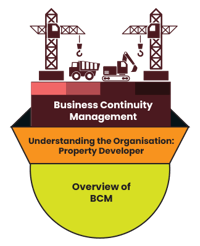 |
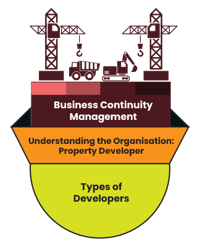 |
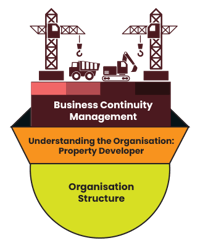 |
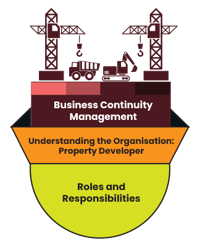 |
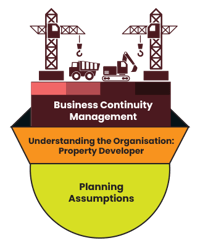 |
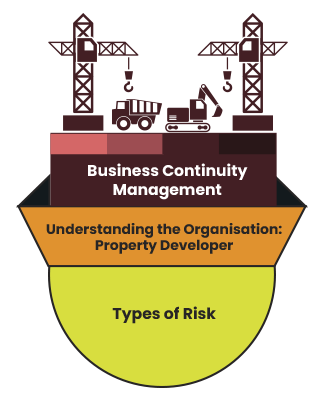 |
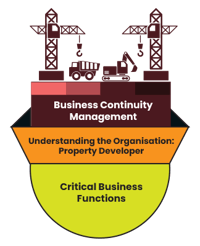 |
|
More Information About Business Continuity Management Courses

 To learn more about the course and schedule, click the buttons below for the BCM-300 Business Continuity Management Implementer [B-3] course and the BCM-5000 Business Continuity Management Expert Implementer [B-5].
To learn more about the course and schedule, click the buttons below for the BCM-300 Business Continuity Management Implementer [B-3] course and the BCM-5000 Business Continuity Management Expert Implementer [B-5].
![Register [BL-B-3]*](https://no-cache.hubspot.com/cta/default/3893111/ac6cf073-4cdd-4541-91ed-889f731d5076.png) |
 |
 |
 |
 |
 |
![FAQ [BL-B-3]](https://no-cache.hubspot.com/cta/default/3893111/b3824ba1-7aa1-4eb6-bef8-94f57121c5ae.png) |
If you have any questions, click to contact us.
|
 |
 |
 |
 |


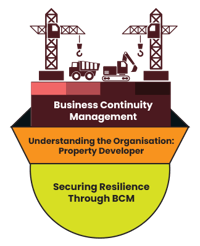
![Email to Sales Team [BCM Institute]](https://no-cache.hubspot.com/cta/default/3893111/3c53daeb-2836-4843-b0e0-645baee2ab9e.png)

